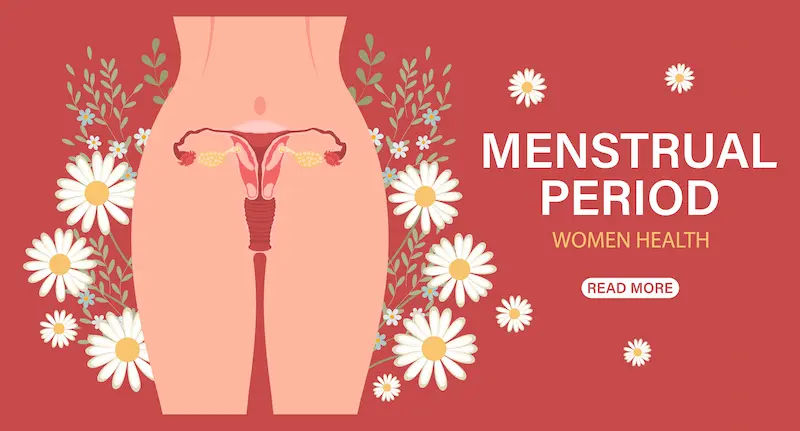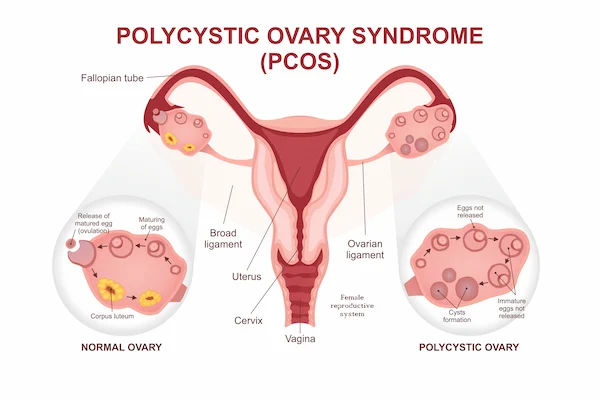Your Menstrual Date: A Guide to Tracking and Understanding Your Cycle
Learn how to track your menstrual cycle effectively. Understand your period dates, phases, and patterns to improve health, fertility, and overall wellbeing.

Written by Dr. Md Yusuf Shareef
Reviewed by Dr. D Bhanu Prakash MBBS, AFIH, Advanced certificate in critical care medicine, Fellowship in critical care medicine
Last updated on 13th Jan, 2026

Introduction
Your menstrual cycle is more than just your period; it's a vital sign, a complex symphony of hormones that offers a window into your overall health. Yet, many of us only think about it when cramps arrive or a period is late. Knowing your menstrual date, the specific day your period begins, is the foundational key to unlocking this powerful knowledge. It’s the first step in predicting your next period, identifying your fertile window, and recognizing when something might be off. This comprehensive guide will demystify your cycle, empowering you with the knowledge to track your menstrual date effectively, understand the phases your body goes through each month, and use this information to take control of your health and well-being. Whether you're planning for a family, managing symptoms, or simply want to be more in tune with your body, this guide is for you.
Why Knowing Your Menstrual Date is Crucial
Your menstrual date, which marks Day 1 of your cycle, is the cornerstone of cycle awareness. It’s not just about avoiding surprises; it’s about proactive health management. By pinpointing this date each month, you begin to see patterns that are unique to your body. This knowledge allows you to predict your next period with greater accuracy, plan events, vacations, and important meetings around your cycle, and manage supplies. More importantly, it helps you identify your fertile window if you're trying to conceive or avoid pregnancy by understanding when you're most likely to ovulate. On a deeper level, consistent tracking can reveal irregularities that may be the first sign of underlying health conditions like Polycystic Ovary Syndrome (PCOS), thyroid disorders, or endometriosis. It transforms your period from a monthly inconvenience into a valuable diagnostic tool.
Consult a Gynaecologist for the best advice
How to Accurately Identify Your Cycle Start Date
This might seem simple, but it's often where confusion begins. Your menstrual cycle start date is specifically the first day you experience full red flow, enough that you need to use a pad, tampon, or menstrual cup. Light spotting or brown discharge that sometimes occurs a day or two before the full flow should not be counted as Day 1. Mark this date on a calendar or in a tracking app. The cycle length is calculated from this Day 1 to the day before your next period begins. For example, if your period started on January 1st and your next period began on January 29th, your cycle length would be 28 days.
The Four Phases of Your Menstrual Cycle Explained
Understanding what happens after your menstrual date provides context for everything you feel throughout the month. The cycle is governed by hormones and can be divided into four key phases.
1. The Menstrual Phase (Days 1-5)
This phase begins on your menstrual date. The lining of the uterus (endometrium) is shed because pregnancy did not occur. Estrogen and progesterone levels are at their lowest, which can contribute to fatigue and low energy.
2. The Follicular Phase (Days 1-13)
This phase overlaps with menstruation. The pituitary gland releases Follicle-Stimulating Hormone (FSH), stimulating the ovaries to produce follicles. One follicle will mature into an egg. Estrogen levels begin to rise again, thickening the uterine lining anew.
3. The Ovulation Phase (Day 14)
A surge in Luteinizing Hormone (LH) causes the ovary to release the mature egg. This is ovulation, and it typically occurs around the midpoint of a 28-day cycle. This is your most fertile period, lasting about 12-24 hours, but sperm can live for several days, making the days leading up to ovulation also fertile.
4. The Luteal Phase (Days 15-28)
After releasing the egg, the follicle transforms into the corpus luteum, which secretes progesterone to maintain the uterine lining. If the egg is not fertilized, the corpus luteum disintegrates, progesterone levels drop, and the cycle ends, ready to begin again with your next period.
What is a "Normal" Menstrual Cycle?
The textbook "average" cycle is 28 days, but what's normal has a wide range. A cycle length between 21 and 35 days is generally considered normal for adults. The key is consistency. If your cycle is consistently 32 days long, that is your normal. It's the significant deviations from your personal pattern that are worth noting. Similarly, period flow can last from 2 to 7 days. Understanding your own version of normal is more important than fitting a perfect 28-day mold.
Top Methods for Tracking Your Period and Symptoms
Gone are the days of just circling a date on a wall calendar. Today, you have powerful tools at your fingertips.
- Period Tracking Apps: You input your menstrual date and daily symptoms (cramps, mood, energy, discharge), and the app uses algorithms to predict your next period and fertile window.
- Physical Calendar or Journal: A simple method that offers a tangible record. Circle your start date each month and jot down notes on flow intensity, pain levels, and emotional state.
- Fertility Awareness Method (FAM): For those seeking precise data, FAM involves tracking basal body temperature (BBT) and cervical mucus changes daily to pinpoint ovulation with high accuracy.
Decoding Irregularities: When to Be Concerned
While some variation is normal, certain patterns are red flags. You should consider consulting a doctor if you experience:
- Consistently irregular cycles: Cycles that are frequently shorter than 21 days or longer than 35 days.
- Missed periods (Amenorrhoea): Having no period for 90 days or more, without being pregnant, breastfeeding, or in menopause.
- Extremely heavy bleeding (Menorrhagia): Soaking through a pad or tampon every 1-2 hours, or passing large blood clots.
- Severe pain (Dysmenorrhoea): Cramps that are debilitating and prevent you from attending work, school, or social activities.
- Bleeding between periods or after sex.
If your period patterns change suddenly or you experience severe pain, consult a doctor online with Apollo24|7 for further evaluation. They can help determine if underlying issues like PCOS, fibroids, or thyroid problems need to be addressed.
How Your Menstrual Date Relates to Fertility and Conception
If you're trying to get pregnant, your menstrual date is your most critical data point. Since ovulation typically occurs about 14 days before your next period (not 14 days after your last one), knowing your average cycle length is essential. For a 28-day cycle, ovulation is around day 14. For a 32-day cycle, it's around day 18. By tracking your cycle over several months, you can predict your fertile window, the 5-6 days leading up to and including ovulation, which dramatically increases your chances of conception.
Beyond the Date: Other Key Signs and Symptoms to Track
To get a full picture of your health, track these alongside your menstrual start date:
- Flow Intensity: Note if your flow is light, medium, heavy, or spotting.
- Pain and Cramping: Location and severity of cramps (mild, moderate, severe).
- Emotional and Mental State: Mood swings, irritability, anxiety, or feelings of sadness.
- Physical Symptoms: Headaches, breast tenderness, acne, bloating, changes in sleep or appetite.
- Cervical Mucus: Changes in consistency (sticky, creamy, egg-white) can signal ovulation.
Lifestyle Factors That Can Influence Your Cycle
Your cycle is a barometer for your overall health. Significant changes can be triggered by:
- Stress: High cortisol levels can delay ovulation or your period entirely.
- Diet and Exercise: Extreme weight loss, low body fat, or intense exercise can disrupt hormonal balance and lead to missed periods.
- Sleep: Poor sleep patterns can interfere with the hormones that regulate your cycle.
- Travel: Changing time zones can temporarily disrupt your rhythm.
Conclusion
Knowing your menstrual date is a simple yet profoundly powerful act of self-care. It’s the first step in moving from a passive experience of your cycle to an active, informed understanding of your body's rhythms. By tracking this date and the accompanying symptoms, you gain the ability to predict your period, optimize your fertility, identify potential health issues early, and navigate your month with greater confidence and control. Your cycle is a unique language; learning to speak it is one of the most empowering things you can do for your health. Start tracking today, grab a calendar, download an app, and begin your journey to deeper body awareness.
Consult a Gynaecologist for the best advice
Consult a Gynaecologist for the best advice

Dr. Saheli Kapat
Obstetrician and Gynaecologist
11 Years • MBBS, DNB Obstetrics & Gynaecology,FMAS(Fellowship in Minimal access surgery)
Kolkata
MCR SUPER SPECIALITY POLY CLINIC & PATHOLOGY, Kolkata

Dr. Sreeparna Roy
Obstetrician and Gynaecologist
8 Years • MBBS , MS (OBSTETRICS & GYNAECOLOGY), Fellowship in Infertility, Endoscopy & Ultrasonography), Fellowship in Laparoscopy & Hysteroscopy,DRM
Barasat
Diab-Eat-Ease, Barasat

Dr. Rituparna De
Obstetrician and Gynaecologist
7 Years • MBBS, MS (Obstetrics & Gynaecology)
Kolkata
MCR SUPER SPECIALITY POLY CLINIC & PATHOLOGY, Kolkata

Dr. Mehnaz Rashid
Obstetrician and Gynaecologist
7 Years • MBBS, DNB (Obstetrics & Gynaecology), D.MAS, F.MAS, WALS
Bengaluru
Wellstar Polyclinic and Diagnostic Center, Bengaluru
(275+ Patients)

Dr. Sanjan Das
Obstetrician and Gynaecologist
15 Years • MBBS,MS
Bengaluru
Apollo Clinic, Sarjapur Road, Bengaluru
Consult a Gynaecologist for the best advice

Dr. Saheli Kapat
Obstetrician and Gynaecologist
11 Years • MBBS, DNB Obstetrics & Gynaecology,FMAS(Fellowship in Minimal access surgery)
Kolkata
MCR SUPER SPECIALITY POLY CLINIC & PATHOLOGY, Kolkata

Dr. Sreeparna Roy
Obstetrician and Gynaecologist
8 Years • MBBS , MS (OBSTETRICS & GYNAECOLOGY), Fellowship in Infertility, Endoscopy & Ultrasonography), Fellowship in Laparoscopy & Hysteroscopy,DRM
Barasat
Diab-Eat-Ease, Barasat

Dr. Rituparna De
Obstetrician and Gynaecologist
7 Years • MBBS, MS (Obstetrics & Gynaecology)
Kolkata
MCR SUPER SPECIALITY POLY CLINIC & PATHOLOGY, Kolkata

Dr. Mehnaz Rashid
Obstetrician and Gynaecologist
7 Years • MBBS, DNB (Obstetrics & Gynaecology), D.MAS, F.MAS, WALS
Bengaluru
Wellstar Polyclinic and Diagnostic Center, Bengaluru
(275+ Patients)

Dr. Sanjan Das
Obstetrician and Gynaecologist
15 Years • MBBS,MS
Bengaluru
Apollo Clinic, Sarjapur Road, Bengaluru
More articles from Menstrual Disorder
Frequently Asked Questions
How many days between periods is normal?
The time from the first day of your period to the first day of your next period (cycle length) is typically between 21 and 35 days. Consistency within your own range is key.
Can stress really delay my period?
Absolutely. High levels of physical or emotional stress can impact the hypothalamus, the part of the brain that regulates your hormones, potentially delaying ovulation and your period.
What is ovulation, and how do I know when it happens?
Ovulation is when your ovary releases a mature egg. Signs include a change in cervical mucus to a raw egg-white consistency, a slight rise in basal body temperature, and sometimes mild pelvic pain (mittelschmerz).
My cycle has always been irregular. Is that a problem?
While some women naturally have less predictable cycles, consistent irregularity can be a sign of an underlying condition like PCOS. It's a good idea to discuss this with a healthcare provider to rule out any concerns.
When should I take a pregnancy test in relation to my period?
For the most accurate result, take a test after you've missed your period. Most tests are reliable from the first day of a missed period. Testing too early can result in a false negative.


.webp)

